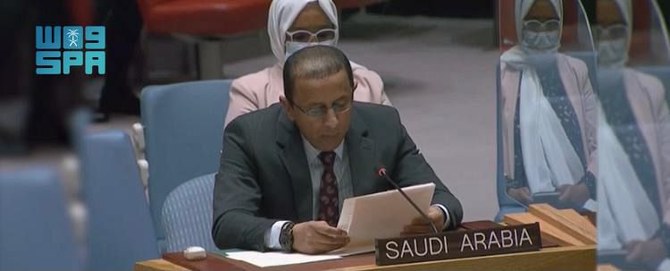NEW YORK: Saudi Arabia’s representative to the UN has told a high-level Security Council meeting that the Kingdom condemns sexual violence in all circumstances, especially in conflict situations where victims face difficulty accessing legal and justice services.
Mohammed Al-Ateeq said that the world is witnessing an increase in all kinds of crises, and expressed his country’s regret over the victims of multiple forms of sexual violence in conflict areas.
He called on the international community to unite to achieve remedies for victims within their countries’ national systems and bring them full justice.
Al-Ateeq was speaking during a Security Council meeting on women, peace and security that discussed conflict-related sexual violence under the theme “Accountability as prevention — ending cycles of sexual violence in conflict.”
He said: “My country believes in the importance of including the voice of women in vulnerable communities, in all assessments of humanitarian needs, as well as involving them in the design and implementation of humanitarian programs, especially those affected by armed conflicts, in order to reach response plans that meet their actual needs, especially in emergency situations.”
He added: “Our contemporary world is going through many daily accelerating events and successive and overlapping crises, which add a new dimension to the negative impacts caused by the COVID-19 pandemic on the health, economic and social aspects, and even has clearly affected humanitarian work.”
Al-Ateeq said that these challenges make it imperative for countries to work on developing joint and comprehensive strategies and approaches that strengthen the role of women in responding to these crises, and facilitates their access to services provided to all, particularly women who care for their families, to maintain their ability and resilience.
Based on the important role women play in building societies, the Kingdom follows a specific approach when providing any humanitarian support targeting women and their needs through analyzing UN reports related to women to link them to the humanitarian needs in the affected countries, he said.
The envoy added that Saudi Arabia was keen to communicate with partners in the targeted countries in order to provide humanitarian and relief projects, focusing on alleviating the suffering of women and helping them to live a decent life.
“My country, represented by the King Salman Humanitarian Aid and Relief Center, has contributed to supporting and empowering women at the humanitarian and relief level in various sectors of humanitarian work in areas of disaster and armed conflict, through implementing 788 projects in 79 regions around the world that included more than 109 million women beneficiaries, amounting to more than $520 million,” he said.
Al-Ateeq said that all of these projects aimed to contribute to raising women’s participation in the economy and labor force, building women’s economic capacities, and increasing their participation in education and training programs in countries affected by armed conflicts.
He added that these efforts include providing psychological and social services, protection services from the effects of gender-based violence, and legal services for refugee women.
He referred to the report of the secretary-general on sexual violence in conflict situations for January to December 2021, and said the Saudi delegation supported the content regarding the phenomenon of terrorist and armed groups using sexual violence as a means of destabilizing fragile societies, stressing that the continued armament, and the illicit flow of small arms and light weapons, are among the factors that have fueled widespread and systematic conflict-related sexual violence.
Al-Ateeq highlighted the documented violations and acts of sexual violence against women committed by the Iran-backed Houthi militia in their areas of control in Yemen, and reiterated the importance of taking the necessary measures through the Security Council to address sexual violence in conflicts, and to punish its perpetrators.
He called on the international community, specifically donor countries, to increase efforts to respond to crimes of sexual violence in conflict situations, stressing the urgent need for coordination and strengthening the interconnected approach between humanitarian work, development and peace to ensure comprehensive and sustainable development in which women participate as a fundamental pillar.
He also called on countries to strengthen proactive and preventive measures, activate appropriate awareness programs to address the root causes of sexual violence in conflict situations, and strengthen the leadership role of women in political, security and legal institutions as an important step.
Al-Ateeq stressed that based on its international commitments and support for all efforts to achieve international peace and security, Saudi Arabia is working to implement UN resolutions, as the Kingdom’s Vision 2030 considers women an important element of strength in society, believing in the importance of equal participation, and the need for their full involvement in all efforts made to maintain peace and security, and at all levels of decision-making.






























